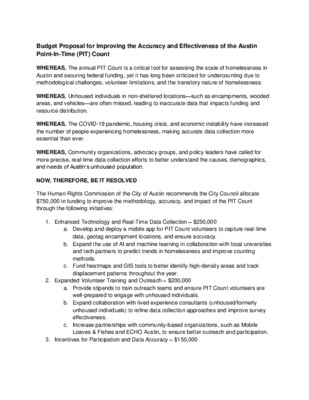Back Up Agenda Item 38_Improving the Accuracy and Effectiveness of the Austin Point in Time Count from the Human Rights Commission — original pdf
Backup

Budget Proposal for Improving the Accuracy and Effectiveness of the Austin Point-In-Time (PIT) Count WHEREAS, The annual PIT Count is a critical tool for assessing the scale of homelessness in Austin and securing federal funding, yet it has long been criticized for undercounting due to methodological challenges, volunteer limitations, and the transitory nature of homelessness. WHEREAS, Unhoused individuals in non-sheltered locations—such as encampments, wooded areas, and vehicles—are often missed, leading to inaccurate data that impacts funding and resource distribution. WHEREAS, The COVID-19 pandemic, housing crisis, and economic instability have increased the number of people experiencing homelessness, making accurate data collection more essential than ever. WHEREAS, Community organizations, advocacy groups, and policy leaders have called for more precise, real-time data collection efforts to better understand the causes, demographics, and needs of Austin’s unhoused population. NOW, THEREFORE, BE IT RESOLVED The Human Rights Commission of the City of Austin recommends the City Council allocate $750,000 in funding to improve the methodology, accuracy, and impact of the PIT Count through the following initiatives: 1. Enhanced Technology and Real-Time Data Collection – $250,000 a. Develop and deploy a mobile app for PIT Count volunteers to capture real-time data, geotag encampment locations, and ensure accuracy. b. Expand the use of AI and machine learning in collaboration with local universities and tech partners to predict trends in homelessness and improve counting methods. c. Fund heatmaps and GIS tools to better identify high-density areas and track displacement patterns throughout the year. 2. Expanded Volunteer Training and Outreach – $200,000 a. Provide stipends to train outreach teams and ensure PIT Count volunteers are well-prepared to engage with unhoused individuals. b. Expand collaboration with lived experience consultants (unhoused/formerly unhoused individuals) to refine data collection approaches and improve survey effectiveness. Increase partnerships with community-based organizations, such as Mobile Loaves & Fishes and ECHO Austin, to ensure better outreach and participation. c. 3. Incentives for Participation and Data Accuracy – $150,000 a. Implement a small compensation program (e.g., gift cards, meals, or basic supplies) for unhoused individuals who participate in the survey to encourage honest responses. b. Provide funding for follow-up surveys throughout the year, ensuring a more continuous and accurate count rather than a one-time snapshot. 4. Specialized Focus on Uncounted Populations – $150,000 a. Expand PIT Count efforts beyond traditional methods to capture harder-to-reach b. Individuals in informal housing situations (couch-surfing, motels, car-living, etc.). c. Youth and LGBTQ+ unhoused individuals, who are often underrepresented in populations, such as: traditional counts. d. Unhoused individuals with mental health conditions or disabilities who may not engage with standard data collection efforts. e. Partner with Austin ISD and higher education institutions to better count unhoused students and youth. NOW, THEREFORE, BE IT FURTHER RESOLVED: The City should explore a year-round monitoring system for homelessness in addition to the annual PIT Count. The City should advocate for expanded state and federal funding based on improved, data- driven insights. The Human Rights Commission will work with Austin’s Homeless Strategy Office, ECHO, and community partners to ensure effective implementation and accountability. The Human Rights Commission of the City of Austin recommends that the City Council allocate a total of $750,000 to enhance the accuracy and effectiveness of the Point-In-Time (PIT) Count, incorporating technology, outreach, training, and incentives to ensure a more comprehensive assessment of Austin’s unhoused population.